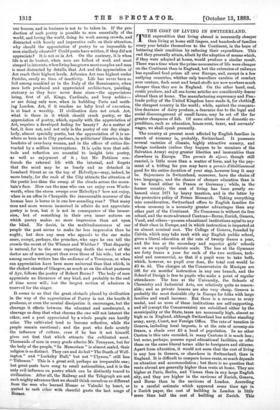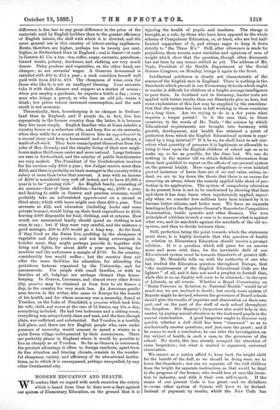THE COST OF LIVING IN SWITZERLAND. 91HE superstition that living
abroad is necessarily cheaper than living at home still lingers, and hundreds of families every year betake themselves to the Continent, in the hope of bettering their condition by reducing their expenditure. This end they generally attain, albeit by the adoption of means which, if they were adopted at home, would produce a similar result. There was a time when the prime necessaries of life were cheaper on the Continent than in England, but the extension of railways has equalised food prices all over Europe, and, except in a few outlying countries, whither only travellers careless of comfort ever venture, flesh meat and bread-stuffs are now nowhere much cheaper than they are in England. On the other hand, coal, exotic produce, and all sea-borne articles are considerably dearer - abroad than at home. The manufacturing supremacy and Free- trade policy of the United Kingdom have made it, for clothint the cheapest country in the world; while, against the compara- tive dearness of dairy produce, a dearness due to the legal and social discouragement of small farms,. may be set off the far greater cheapness of fish. Of some other items of domestic ex- penditure, such as education, house-rent, taxes, and servants' wages, we shall speak presently.
The country at present most affected by English families in search of economy is, probably, Switzerland. It possesses several varieties of climate, highly attractive scenery, and foreign residents (unless they happen to be members of the Salvation Army) enjoy greater liberties and immunities than elsewhere in Europe. The pertnis de sgjour, though still exacted, is little more than a matter of form, and by the pay- ment of a trifling fee you may have a permit d'etabliesement good for the entire duration of your stay, however long it may be. Sojourners in Switzerland, moreover, have the choice of two languages, and the chance of cheaper education than is to be found either in France or Germany ; while, in the• former country, the cost of living has been greatly en- hanced since 1871 by heavy taxation, and in the latter by the protective policy of Prince Bismarck. Taking everything into consideration, Switzerland offers to English families for whom economy is a necessity greater advantages than any other part of the Continent. No Commune is without its free school, and the more advanced Cantons—Berne, Zurich, Geneva, Vaud, and others—possess educational institutions equal to any of their class in Europe, and in which instruction is imparted at an almost nominal cost. The College of Geneva, founded by Calvin, which may take rank with any English public school, gives a liberal education at the rate of twenty francs a year, and the fees at the secondary and superior girls' schools are on an equally moderate scale. The fees at the Gymnase are forty francs a year for each of the two sections, tech- nical and commercial, so that if a pupil were to take both, which, however, no pupil ever does, the total cost would be 23 -is. 4d. The charges at the Conservatoire de Musique are 50f. for six months' instruction in any one branch, and the School of Design is free to pupils who make a point of regular attendance. The fees at the University, the Schools of Chemistry and industrial Arts, are relatively quite as reason- able ; and as private lessons are also very cheap, Geneva is probably the most desirable city in Europe for folks With large , families and small incomes. Bat there is a reverse to every medal, and as none of these. institutions are self-supporting, and all (except the Conservatoire) are subsidised either by the municipality or the State, taxes are necessarily high, almost as high as in England, although Switzerland has neither standing army, navy, Court, nor Foreign Office. The rate of taxation in Geneva, including local imposts, is at the rate of seventy-six francs, a shade over 23 a head of population. In no other Canton is this rate exceeded, in many Cantons it is much less; but none, perhaps, possess equal educational facilities, or offer them on the same liberal terms alike to foreigners and citizens. Apart from education, it would not seem that the cost of living is any less in Geneva, or elsewhere in Switzerland, than in England. It is difficult to compare house-rents, so much depends on situation and accommodation ; but there is no question that rents abroad are generally higher than rents at home. They are higher at Paris, Berlin, and Vienna than in any large English city, and they are higher in the environs of Zurich, Geneva, and Berne than in the environs of London. According to a careful estimate which appeared some time age in a Zurich paper, the cost of building in London is little more than half the cost of building at Zurich. This
difference is due less to any great difference in the price of the materials used by English builders than to the greater efficiency of English labour, the' skill with which it is directed, and the more general use in this country of labour-saving appliances. Rents, therefore, are higher, perhaps ten to twenty per cent. higher, in Switzerland than in England ; coal is dearer—it costa in Geneva 21 15s. a ton—tea, coffee, sugar, currants, petroleum, tinned meats, pottery, hardware, and clothing are very much dearer. Dairy produce and vegetables, on the other hand, are -cheaper; so are servants' wages. A Genevan housemaid is satisfied with 210 to 212 a year; a cook considers herself well paid with from 212 to 216. The cheapness of wine, even for those who like it, is not an unalloyed blessing. Your servants take it with their dinners and suppers as a matter of course ; when you employ a gardener, he expects a bottle a day ; every man who brings a parcel, or who does an odd job, wants a 'drink; low prices induce increased consumption, and the nett result is not economy.
Theoretically, then, housekeeping is no cheaper in Switzer- 1and than in England, and if people do, in fact, live less -expensively in the former country than the latter, it is because they live more simply. English families who at home inhabit a country house or a suburban villa, and keep five or six servants, when they settle for a season at Geneva hire an appartentent in a second story and keep a housemaid and a cook, or, perhaps, a maid-of-all-work. They have emancipated themselves from the yoke of Mrs. Grundy, and the simpler living of their new neigh- bours makes thrift seem easier and more natural. Large fortunes are rare in Switzerland, and the salaries of public functionaries are very modest. The President of the Confederation receives for his services only 2600 a year; few Judges receive more than 2250, and there is probably no bank manager in the country with a salary of more than twice that amount. A man with an income of 2500 is considered very well off indeed, and to have 21,000 a year is to be "passing rich." An English family, consisting of six persons—four of them children—having, say, 2500 a year, and desiring to settle in Geneva and practise economy, would probably take an unfurnished appartentent on a second or third story, which with taxes might cost them 260 a year. Two -servants at 222, and education (including books and some private lessons), would bring up their fixed expenditure to 2100, leaving 2400 disposable for food, clothing, and et cetseras. How much our economical family should spend on clothing is not -easy to say ; but if they were very careful, and the mistress a good manager, 260 to 270 would go a long way. As for food, if they lived as the Swiss live, profiting by the cheapness of vegetable and dairy produce, and not being extravagant in thatcher meat, they might perhaps provide it, together with firing and lights, for about 2200 a year more, leaving for sundries and the unforeseen a margin of 2130. In the country, considerably less would suffice ; but the country does not ,offer the same facilities for education, for attending the gratuitous lectures organised by the University, and for amusements. For people with small families, or with no families at all, lodgings are perhaps cheaper than house- keeping. In Geneva, Lausanne, and almost every other Swiss city, pension may be obtained at from four to six francs a day, in the country for very much less. An American gentle- man known, to the writer, who came to Europe for the benefit of his health, and for whom economy was a necessity, found at Yverdun, on the Lake of Neuchatel, a pension which took him, his wife, child, and nurse at the rate of 12 francs, say 10s. a day, everything included. He had two bedrooms and a sitting-room, everything was scrupulously clean and neat, and the fare, though plain, was sufficient and substantial. But Yverdun is a terribly dull place, and there are few English people who, save under pressure of necessity, would consent to spend a winter in a quiet Swiss village unfrequented by their countrymen. There are probably places in England where it would be possible to live as cheaply as at Yverdun. So far as Geneva is concerned, the greatest advantage it offers to foreign residents, apart from its fine situation and bracing climate, consists in the wonder- ful cheapness, variety, and efficiency of its educational institu- tions, as to which it is unsurpassed, perhaps unequalled, by any other Continental city.



































 Previous page
Previous page